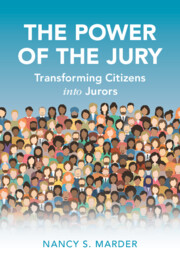Book contents
- The Power of the Jury
- Cambridge Studies in Law and Society
- The Power of the Jury
- Copyright page
- Contents
- Acknowledgments
- Introduction
- 1 The Summons and the Setting: Beginning the Transformation of Citizens into Jurors
- 2 Voir Dire: Introducing Jurors to the Judge, Their Fellow Jurors, and Their Role
- 3 Peremptory Challenges: A Barrier That Unnecessarily Limits Who Can Serve as Jurors
- 4 Jury Instructions: Reinforcing Group Identity and Making Instructions Accessible to Jurors
- 5 Jury Deliberations: Performing the Jury’s Main Task with Some Assistance from the Judge
- 6 The Post-Verdict Interview: How Judges Can Help Jurors in Their Transformation from Jurors into Engaged Citizens
- Conclusion
- Index
- Cambridge Studies in Law and Society
6 - The Post-Verdict Interview: How Judges Can Help Jurors in Their Transformation from Jurors into Engaged Citizens
Published online by Cambridge University Press: 25 August 2022
- The Power of the Jury
- Cambridge Studies in Law and Society
- The Power of the Jury
- Copyright page
- Contents
- Acknowledgments
- Introduction
- 1 The Summons and the Setting: Beginning the Transformation of Citizens into Jurors
- 2 Voir Dire: Introducing Jurors to the Judge, Their Fellow Jurors, and Their Role
- 3 Peremptory Challenges: A Barrier That Unnecessarily Limits Who Can Serve as Jurors
- 4 Jury Instructions: Reinforcing Group Identity and Making Instructions Accessible to Jurors
- 5 Jury Deliberations: Performing the Jury’s Main Task with Some Assistance from the Judge
- 6 The Post-Verdict Interview: How Judges Can Help Jurors in Their Transformation from Jurors into Engaged Citizens
- Conclusion
- Index
- Cambridge Studies in Law and Society
Summary
Chapter 6 explores the final stage of the jury process, the post-verdict interview with the judge. This interview provides an opportunity for the judge to thank jurors for their service, to answer their remaining questions, to provide them with information about issues that might arise after they leave the courthouse, and to give them an opportunity to share their jury experience with the judge. The traditional view often overlooks the post-verdict interview with the judge. Some judges provide such an interview; others do not. However, the post-verdict interview can play an important role in the jurors' transformation. It can help jurors leave their public role as jurors and return to their lives as private citizens. The post-verdict interview also helps jurors to end their jury service on a positive note. This is important so that when they return to their family and friends they will serve as emissaries for the jury system, and might even become more engaged citizens. The post-verdict interview also gives judges the opportunity to learn about the jurors' experience and to discover how the jury process can be improved for future jurors.
- Type
- Chapter
- Information
- The Power of the JuryTransforming Citizens into Jurors, pp. 209 - 243Publisher: Cambridge University PressPrint publication year: 2022

